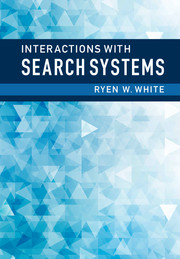Book contents
- Frontmatter
- Dedication
- Contents
- Preface
- 1 Introduction
- Part I Background
- Part II System SupportHelping People Search
- 5 Helping People Search
- 6 Exploration, Complexity, and Discovery
- 7 Learning and Use
- 8 Interaction beyond the Individual
- 9 Personalization and Contextualization
- Part III Evaluation
- Part IV Opportunities and Challenges
- Notes
- References
- Index
- Plate section
8 - Interaction beyond the Individual
from Part II - System SupportHelping People Search
Published online by Cambridge University Press: 05 March 2016
- Frontmatter
- Dedication
- Contents
- Preface
- 1 Introduction
- Part I Background
- Part II System SupportHelping People Search
- 5 Helping People Search
- 6 Exploration, Complexity, and Discovery
- 7 Learning and Use
- 8 Interaction beyond the Individual
- 9 Personalization and Contextualization
- Part III Evaluation
- Part IV Opportunities and Challenges
- Notes
- References
- Index
- Plate section
Summary
People are important recipients and consumers of search outcomes, and can also be important participants in the search process – pursuing common search objectives and helping searchers answer questions. Many search systems model information seeking as a solitary process comprising interaction between human and machine. However, interactive searching occurs within a social context (Ingwersen and Järvelin, 2005). Frequently, the outcomes of searches are meant to inform interactions with others or to create resources that influence or are used by other people. In addition, searchers can benefit from other people's expertise and experiences. Conversations between individuals can assist with developing a plan and help searchers crystalize their thinking about a path forward.
As the world becomes more connected, interactions with other people are going to play an increasingly important role in search interaction. Search systems can play a central role in facilitating interpersonal interactions, both in terms of connecting people and in mediating their dialogs. They can connect strangers pursuing the same task at the same time (Bateman et al., 2012; González-Ibáñez et al., 2015), and facilitate co-searching between friends and colleagues alike (Morris and Horvitz, 2007; Amershi and Morris, 2008). The strangers may be search experts who can provide guidance on search strategies that would help people locate their information faster by better understanding how best to query, and/or they could be subject matter experts with the domain knowledge to answer searcher questions directly via synchronous or asynchronous communication channels without requiring further engagement with the search system (Adamic et al., 2008).
Social information can be employed by search systems in a number of ways, including: (1) asking others (e.g., social question and answer, where experts can help searchers answer questions); (2) working together (e.g., collaborative information seeking – including cases for which the collaboration may be initiated by the search system (González-Ibáñez et al. [2012]); (3) learning from the behavior of others in the aggregate (e.g., trails extracted from search logs can provide guidance on where searchers should go next; see Wexelblat and Maes [1999] and Joachims [2002]); (4) learning from link creation (e.g., hyperlink analysis of resources explicitly connected by document authors; see Brin and Page [1998] and Kleinberg [1999]), and; (5) explicit recommendations (e.g., recommender systems [see Konstan and Riedl, 2012]). Points (3), (4), and (5) are covered elsewhere in the book.
- Type
- Chapter
- Information
- Interactions with Search Systems , pp. 249 - 266Publisher: Cambridge University PressPrint publication year: 2016



